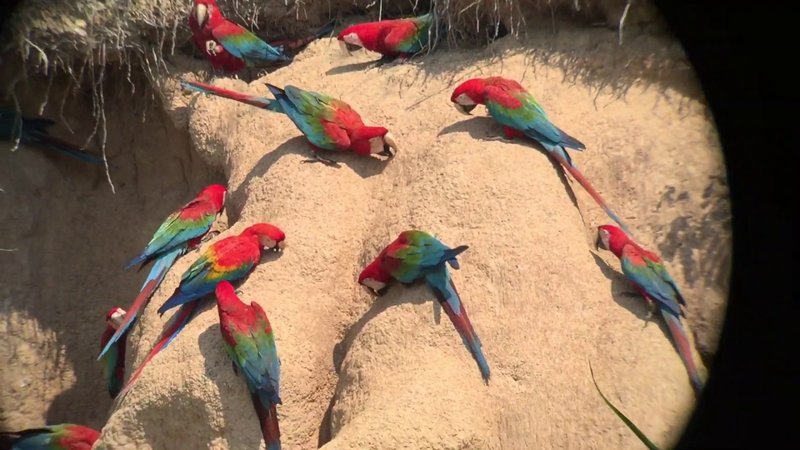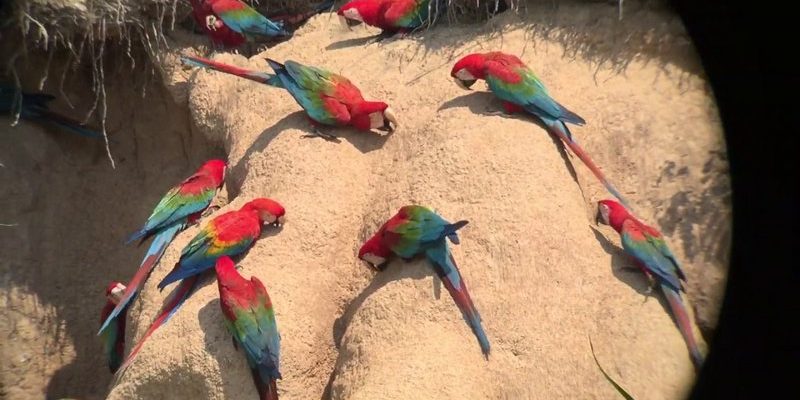
Macaws are part of the parrot family, and they’re known for their strong beaks and social behavior. With their diets primarily consisting of fruits, seeds, nuts, and sometimes flowers, these birds are true foragers. Let’s dive into the world of macaw diets, how they hunt or forage for their meals, and why what they eat matters in their habitats.
What Do Macaws Eat?
Macaws are essentially fruit enthusiasts. Their diets are as vibrant as their feathers! Fruits are the primary component of a macaw’s meals, providing essential vitamins and energy. You’ll often find them munching on bananas, papayas, and various berries. These foods are not only tasty but also crucial for their health.
In addition to fruits, macaws enjoy nuts and seeds. They have strong beaks designed to crack through tough shells. Some of their favorites include almonds, walnuts, and macadamia nuts. These high-energy foods help sustain them during their active days of flying and foraging. And let’s not forget about flowers! Occasionally, macaws will nibble on the blossoms and nectar of plants, adding some variety to their diet.
One of the most surprising things about macaw diets is their digestive system. It’s specially adapted to process fibrous foods found in the wild. This means they can extract nutrients from tough, hard-to-digest items that other birds might struggle with. Pretty impressive, right?
How Do Macaws Forage for Food?
Now that we know what macaws eat, let’s explore how they find their meals. For macaws, foraging is like a treasure hunt. They often start their day early, flying high above the treetops to scout for food. With their excellent vision, they can spot ripe fruits or nut trees from a distance.
When it comes to foraging, macaws are social creatures. They usually travel in groups, which is not just for fun—it’s a strategic move! More eyes mean a better chance of spotting food. And they even communicate with each other while foraging, making loud calls to point out food sources. It’s like having a buddy system in the wild!
As they land on branches, they use their strong feet to hold onto the tree while they reach out to grab food. Those powerful beaks come into play again, allowing them to crack open tough seeds or peel fruits. And here’s the thing: their foraging habits can significantly impact the forest ecosystem. By eating and then dispersing seeds, they help new plants grow. Pretty cool, right?
Seasonal Differences in Diet
Just like we have seasonal favorites, macaws change their diet based on what’s available. During the dry season, they might stick to nuts and seeds since these are more abundant. In contrast, when the rainy season rolls in and fruits become ripe, you’ll see them munching on a lot more sweet treats.
This seasonal shift isn’t just about variety; it’s essential for their survival. Macaws need a balanced intake of vitamins, minerals, and energy sources to stay healthy. Keeping up with their changing food sources is a clever adaptation that helps them thrive in their natural habitats.
For example, during the fruit season, you might spot them in large flocks feasting on berries in the treetops. In the dry months, you’ll find them foraging for those tasty seeds hidden within tree bark. They are masters at adapting, which keeps their diets interesting year-round.
Foraging Challenges and Strategies
While foraging sounds simple, it’s not always easy. Macaws face numerous challenges, from finding food to dealing with competition. Other birds often scramble for the same food sources, and there are predators to watch out for, too.
To tackle these challenges, macaws have developed some clever strategies. One approach is to be opportunistic. If a macaw spots a fruit tree from a distance, it might wait for other birds to pick at it first. Once the coast is clear, they’ll swoop down and take their turn. They also rely on their strong social bonds—sometimes, working with their flock makes foraging more efficient.
Additionally, macaws have a keen sense of rememberance. They can recall where they’ve found food before, allowing them to visit their favorite spots repeatedly. This memory is crucial, especially when food availability fluctuates.
The Importance of a Balanced Diet
You might be wondering why all this matters. Well, a macaw’s diet directly affects its health and lifespan. A balanced intake of fruits, seeds, and nuts ensures they get the right nutrients to retain their colorful plumage, strong bones, and energy for daily activities.
Moreover, diet impacts their reproductive success. Healthy macaws are more likely to produce healthy chicks. An inadequate diet can lead to malnourishment, making it difficult for them to thrive. In the wild, every bite counts, especially if they want to raise a successful family!
It’s an intricate balance—macaws not only have to take care of themselves but also contribute to the ecosystem. By eating fruits and seeds, they help with plant reproduction, maintaining the biodiversity of their habitats.
How Human Activity Affects Their Foraging
Sadly, macaws’ foraging habits are influenced by human activity. Deforestation and habitat loss greatly affect where they can find food. Many native fruit trees are cut down, limiting their foraging areas and forcing them to adapt quickly to new diets.
When we encroach upon nature, we impact the entire ecosystem. The loss of food sources means competition may increase for the remaining trees, putting more stress on these beautiful birds. Conservation efforts are crucial. Protecting the habitats they depend on ensures that macaws can continue to thrive.
In some areas, efforts are underway to plant more native fruit trees. These initiatives not only help macaws but also restore balance to the ecosystem, allowing various species to coexist harmoniously.
Macaws are truly remarkable creatures with a unique relationship with their food sources. Their brightly colored feathers might grab your attention, but it’s their foraging skills and diets that showcase their adaptability and intelligence. From flying high to scout for ripe fruits to sharing their findings with the flock, every aspect of their eating habits paints a picture of survival and community.
Understanding what macaws eat and how they forage not only deepens our appreciation for these birds but also highlights the importance of maintaining their habitats. By protecting their environments and supporting conservation efforts, we can ensure that future generations will continue to see these vibrant birds soaring through the skies, hunting for the next meal with the same skill and charm they’ve shown for centuries.

